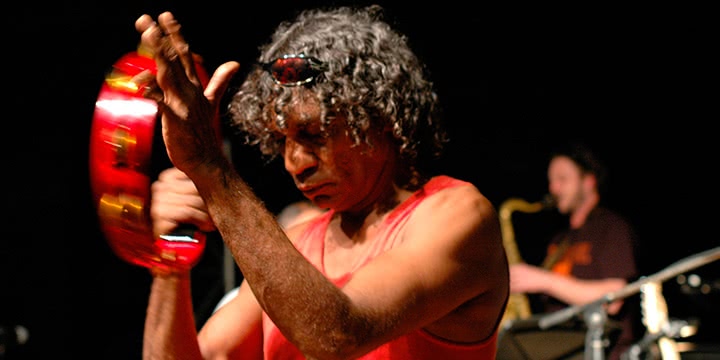Bart Willoughby is a man of many firsts.
He was part of the first Australian indigenous rock band, No Fixed Address, to tour overseas. He was the first Aboriginal man to perform on Countdown, the first to sign a record deal, and the first to score, perform and direct the music for a feature film (1992’s Jindalee Lady). He received an Indigenous ARIA Lifetime Achievement award back in 1993, and shows no sign of slowing down anytime soon. With the 2016 edition of Yabun Festival just a week away, Willoughby is already planning for the future, and when we talk, he has just finished a long day of children’s workshops.
“Teaching. It’s really weird,” Willoughby muses. “I’m teaching percussion, so I started with really small instruments, teaching how to use their fingers to hit the bongos. The main bongo is too big for them, so if I give them a small one I can have them concentrate on their fingers. What I try and do is work out what their capabilities are, so I start small so they can understand what areas they’re hitting. The hands come later – first fingers, [then] palm. They’ll end up using the whole hand to create by the end. In other words, they learn how to talk with the drum.
“[The kids] help me remember. I always come back to where I began. And also, it’s a nice way of bringing music that’s not corrupt in a way. Music is so corrupt at the moment, it’s nearly worse than art. I think commercial things are a perfect example of how the industry takes the music away from the people. You have to pay for everything.”
It is easy to dismiss offhand the commercial perils of the music industry today – many acknowledge the ferocity and greed of the market, yet carry on dancing to the same beat. But Willoughby has borne witness to the darker side of the industry for decades now. In 1981, he starred in Ned Lander’s award-winning feature Wrong Side Of The Road, which depicted the racism faced by indigenous musicians in rural venues. Asked if he is pessimistic about how far Australian attitudes towards indigenous acts have developed since then, Willoughby admits that he is.
“Music in Australia is fraught with weird entities. It doesn’t become the music industry, it becomes something else that somehow leaks into the innocence of the community. It’s thinking money all the time, so it doesn’t have time for compassion. It looks like there’s a certain mob, and it’s a bit like Groundhog Day – they keep doing the same thing, and that’s why commercial music is only interested in major chords. It’s so confusing that it works.
“Music is like being in the middle of everything. You can go one extreme to the other, it’s so flexible. Lots of people don’t get to find their character in music because it’s so in the middle. It’s a bit like life. If you don’t know what you’re looking at, you can easily turn left and right and forget about that beautiful experience of finding out the meaning, because it is there for individuals, and each individual will find that in different ways.”
Though the Pitjantjatjara artist’s reflections are certainly touched with a trace of despair at the course of our cultural development, he remains hopeful that the next generation can be encouraged to embrace their creative and spiritual selves; to become reacquainted with Mother Nature. Willoughby’s performance at Yabun Festival will feature his entire band and showcase just how accomplished these performers are. But mostly, it is going to be a celebration of the eternal ability of music bringing people together and reminding them of the things in life Willoughby believes matter most.
“Somehow the [culture] today can destroy the innocence of my soul if I’m not careful, which it has done to a lot of people. If you look at how many stars made it, to how many we never got to hear, who got squashed, you don’t get to see those beautiful people. Most of these people were like me and other individuals, but I think I’m stronger because I did grow up prepared for this chaos. I’m sticking to my guns, to the very end of life as we know it. I know it’s a battle. What am I fighting against? It looks like I’m fighting against bad entities. I want to preserve the innocence of imagination, so that our compassion can be strong with the innocence of Mother Nature.”
At 55, Willoughby insists that he is still only just beginning his musical odyssey. It has been a long and remarkable road, and there was never any doubt he would travel it in his own way.
“I think I know what I’m looking at. By the time I was 16 or 17, I pretty well knew what I was looking at in life. You can’t explain it really, you don’t know how to use the words yet. I’d just be out playing, singing something, and that’s like talking, I think. But that takes a lot of years, and you have to centre yourself, because you can go left, you can go right. I use the music to centre myself so I don’t get corrupted by anything else. There are certain things in the middle that can take you away from the middle. Try and use all the colours to make some distinction.”
Bart Willoughby playsYabun Festival 2016, along with Radical Son, Yarwah, Evie J Willie and more, at Victoria Park, Camperdown onTuesday January 26; and also at The Bowl Rebellion, Marrickville Bowling Club.


































